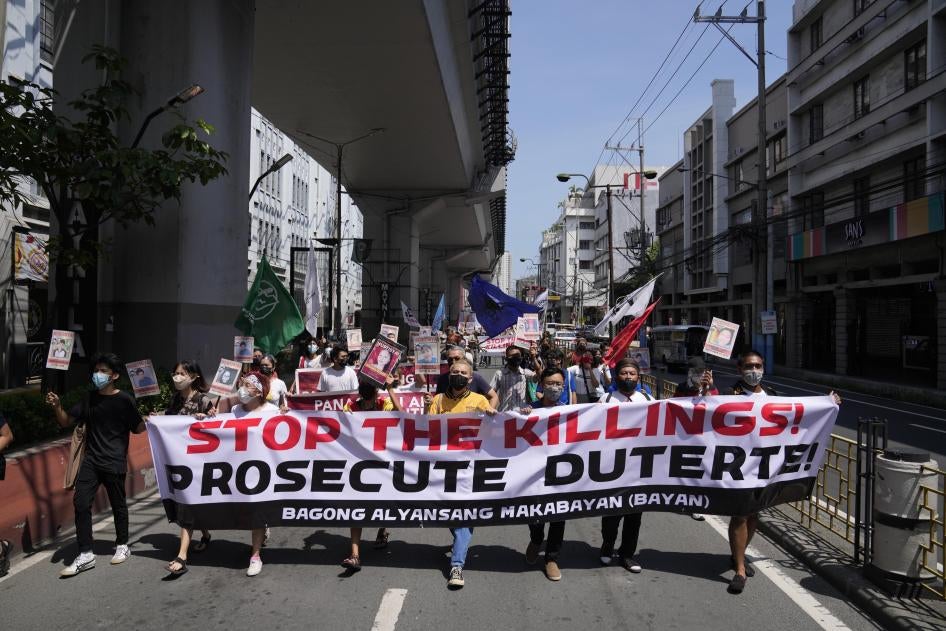(New York) – The appeals chamber of the International Criminal Court (ICC) on July 18, 2023, confirmed the prosecutor’s resumption of the investigation into alleged crimes against humanity in the Philippines, Human Rights Watch said today. The ruling is the next step toward justice for the thousands of victims of extrajudicial killings and their families in the government’s “war on drugs.”
President Ferdinand Marcos Jr. should support accountability for grave crimes in the Philippines and uphold the country’s obligation under the court’s founding Rome Statute to cooperate with the court.
“The ICC appeals chamber decision rejects Philippine government claims that the ICC should not investigate in the country,” said Bryony Lau, deputy Asia director at Human Rights Watch. “President Marcos should back up his stated commitment to human rights by cooperating with the ICC prosecutor’s inquiry.”
The ruling follows the Philippine government’s appeal of the decision by the court’s pretrial chamber on January 26 authorizing the resumption of the prosecutor’s investigation in the Philippines. In November 2021, the Philippine government had asked the ICC prosecutor to defer his investigation, opened in September 2021, claiming that national authorities had begun their own investigations into cases of extrajudicial killings attributed to the police during “drug war” operations.
However, in June 2022, the court’s prosecutor, Karim Khan, asked the ICC judges to allow him to resume the investigation. He said that the Philippine government had not substantiated its deferral request and that the domestic proceedings referenced “[did] not sufficiently mirror the court’s investigation.”
In its appeal to the authorization to resume the court’s probe, the Philippine government argued that in their January 26 decision, the ICC judges mistakenly found that the court has jurisdiction over the situation in the Philippines, although the Philippines withdrew from the Rome Statute, in March 2019, and that they erred in assessing ongoing national proceedings.
In its decision, the majority of appeals chamber judges dismissed all the Philippine government’s arguments. In particular, the majority rejected the government’s assertion that the pre-trial chamber erred in assessing the existence of domestic proceedings that would warrant a deferral of the investigation to domestic authorities through genuine investigations and prosecutions of crimes under the court’s jurisdiction. The majority also decided that it could not address the issue of jurisdiction raised by the Philippine government at this point; they noted that the pre-trial chamber in its January 26 decision did not make a positive finding on this issue and instead had just recalled its previous conclusions at the time it authorized the opening of the investigation in September 2021. This does not prevent the issue of jurisdiction to be raised again at later stages in the proceedings, for example if a case is eventually brought before the court. Two judges disagreed with the majority and stated that the appeals chamber should have addressed the issue at this stage and noted that in their view the court does not have jurisdiction over this situation because the prosecutor requested authorization to open its probe after the Philippines’ withdrawal came into effect.
While Marcos has publicly acknowledged “lapses” in the “drug war” waged by his predecessor, former President Rodrigo Duterte, he stopped short of denouncing the killings of more than 6,200 people during police drug raids. Administration officials have denounced the ICC, accusing it of interfering in the country’s affairs. Since taking office a year ago, the Marcos administration has done little to advance accountability for these extrajudicial killings and recognize the suffering of victims and their families.
“The ICC’s decision is a step toward justice for victims of extrajudicial killings,” Lau said. “This is also an opportunity for President Marcos to change course and break away from the culture of abuses and impunity that have long bedeviled the Philippines.”








